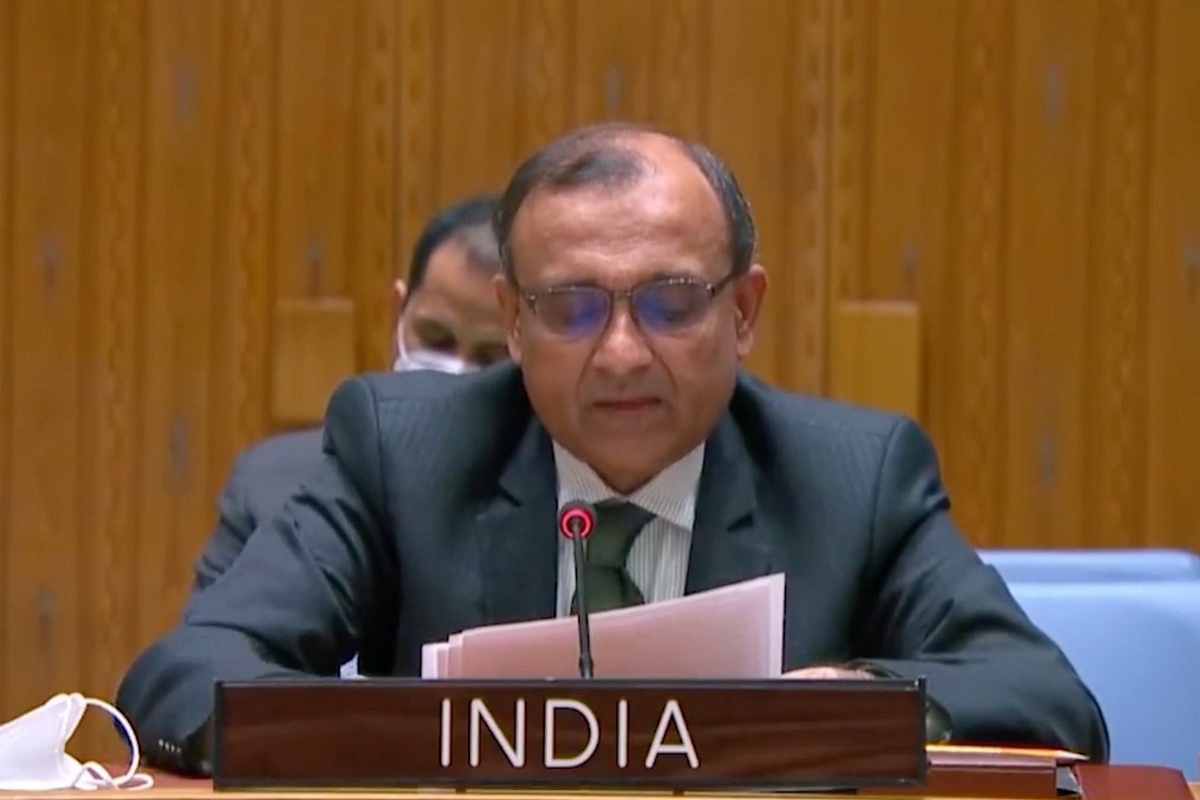World
Resolution Elevating Islamophobia To International Day May Downplay Seriousness Of Phobias Against All Other Religions: India At UN

India's Envoy to UN T S Tirumurti (Pic Via Twitter)
India on Tuesday (15 March) expressed concern over a resolution adopted by United General Assembly to declare 15 March as International Day to Combat Islamophobia, saying that adoption of the resolution may well end up downplaying the seriousness of phobias against all other religions.
Explaining India's position on the resolution, India's Ambassador to the UN T S Tirumurti said that New Delhi was deeply concerned on the rise in instances of discrimination, intolerance and violence directed against members of many religious communities in various parts of the world.
"As a pluralistic and democratic country which is home to almost all religions of the world, India has always welcomed, over the centuries, those persecuted around the world for their faith or belief. They have always found in India a safe haven shorn of persecution or discrimination. This is true whether they were Zoroastrians or Buddhists or Jews or people of any other faith," said Tirumurti.
"Therefore, it is with deep concern that we have viewed the growing manifestation of intolerance, discrimination or violence against followers of religions, including rise in sectarian violence in some countries," he added, according to an official statement.
Tirumurti noted that India condemn all acts motivated by "anti-semitism, Christianophobia or Islamophobia".
"However, such phobias are not restricted to Abrahamic religions only. In fact, there is clear evidence that over decades such religiophobias have, in fact, affected the followers of non-Abrahamic religions as well. This have contributed to the emergence of contemporary forms of religiophobia, especially anti-Hindu, anti-Buddhist and anti-Sikh phobias," he said.
These contemporary forms of religiophobia can be witnessed in the increase in attacks on religious places of worship like gurudwaras, monasteries, temples etc. or in spreading of hatred and disinformation against non-Abrahamic religions in many countries, said Tirumurti.
He cited many examples including the destruction of Bamyan Buddha, violation of gurudwara premises, massacre of Sikh pilgrims in gurudwara, attack on temples, glorification of breaking of idols in temples etc, that contribute to the rise of contemporary forms of religiophobia against non-Abrahamic religions.
The Indian envoy said that Hinduism has more than 1.2 billion followers, Buddhism more than 535 million and Sikhism more than 30 million spread out around the world.
He added,"It is time that we acknowledged the prevalence of religiophobia, rather than single out just one".
"It is in this context that we are concerned about elevating the phobia against one religion to the level of an international day, to the exclusion of all the others. Celebration of a religion is one thing but to commemorate the combatting of hatred against one religion is quite another. In fact, this resolution may well end up downplaying the seriousness of phobias against all other religions," Tirumurti said.
He added that in 2019, UN had already proclaimed 22 August as the International Day "commemorating the victims of acts of violence based on religion or belief, which is fully inclusive in nature".
"We even have an International Day of Tolerance observed on 16 November. We are not convinced that we need to elevate phobia against one religion to the level of an international day. We need to always be inclusive, especially in the United Nations," the Indian Envoy said.
"India is proud that pluralism is at the core of our existence and we firmly believe in equal protection and promotion of all religions and faith. It is, therefore, unfortunate that word ‘pluralism’ finds no mention in the resolution and the sponsors have not found it fit to take on board our amendments to include the word “pluralism” in the text for reasons best known to them," he said.
"We hope that the resolution adopted today does not set a precedent which will lead to multiple resolutions on phobias based on selective religions and divide the United Nations into religious camps. It is important that the United Nations remains above such religious matters which may seek to divide us rather than bring us together on one platform of peace and harmony and treat the World as One Family," Tirumurti said.
Support Swarajya's 50 Ground Reports Project & Sponsor A Story
Every general election Swarajya does a 50 ground reports project.
Aimed only at serious readers and those who appreciate the nuances of political undercurrents, the project provides a sense of India's electoral landscape. As you know, these reports are produced after considerable investment of travel, time and effort on the ground.
This time too we've kicked off the project in style and have covered over 30 constituencies already. If you're someone who appreciates such work and have enjoyed our coverage please consider sponsoring a ground report for just Rs 2999 to Rs 19,999 - it goes a long way in helping us produce more quality reportage.
You can also back this project by becoming a subscriber for as little as Rs 999 - so do click on this links and choose a plan that suits you and back us.
Click below to contribute.
Latest